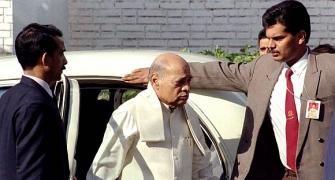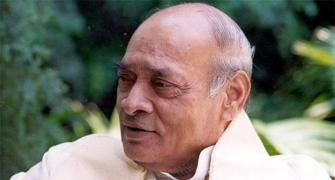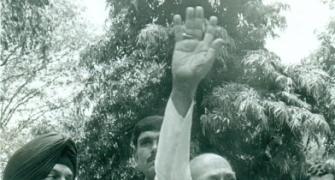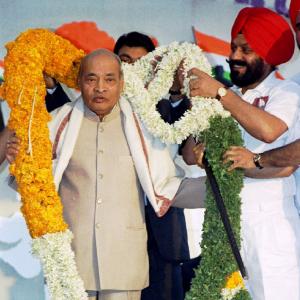'Narasimha Rao asked me why China was doing so well in attracting foreign investments and I gave my frank opinion.'
'I told him that giving thrust to exports had to be a national effort.'
'But in India, the system was very centralised in the Government of India and the state governments had no role to play.'

Ravi Sawhney went to Punjab as a young IAS officer in 1969 and spent the next two decades in what turned out to be an eventful, useful and memorable experience in public service.
Belonging to an older and vanishing tribe of IAS officers, Mr Sawhney has written an engaging memoir Living a Life which gives a fascinating account of a rich professional experience with warm vignettes from his personal life.
"India is considered as one of the countries which can bring stability and provide stimulus to world economic growth," Mr Sawhney says in the third part of his interview to Rediff.com's Archana Masih.
- Part 1: 'Centre can't abdicate its responsibility'
- Part 2: 'Political situation in Punjab has been somewhat volatile'
You saw the tenures of several prime ministers as a civil servant -- Indira Gandhi, Morarji Desai, Rajiv Gandhi. How different was the working of the bureaucracy under each PM?
I left the Government of India as joint secretary level so I wasn't at a senior level to have direct dealings with the prime minister.
During Indira Gandhi's time, I had occasion to meet her when she came to Punjab during the elections in 1980, and subsequently when I set up the Punjab pavilion in Delhi. I found her very easy to talk to and she was an attentive listener.
I had met her earlier as a student which was a very interesting anecdote that I mention in my book.

I had occasion to meet Morarji Desai when I formulated the integrated rural development programme in Punjab and he came to launch it.
I had earlier met him when he came as the deputy prime minister to the IAS academy and presented the director's medal for physical fitness to me. I met both Indira Gandhi and Morarji Desai prior to my being part of the government.
Although I didn't work with Narasimha Rao, I met him when he came as prime minister to Bangkok. He asked me why China was doing so well in attracting foreign investments as compared to India and I gave my frank opinion.
I told him that giving thrust to exports had to be a national effort. But in India, the system was very centralised in the Government of India and the state governments had no role to play.
I indicated by example, that in Punjab, the Punjab Export Cooperation never played any role to promote exports and the State Government had no authority to approve foreign investments.
Provincial governments in China had authority to approve foreign investment proposals whereas in India it was highly centralised.
Mr Narasimha Rao and I had a very frank talk. I was informed that Prime Minister Rao had asked the taskforce to also examine the points I had made. He was a prime minister with an open mind and we all know that his government did launch the process of liberalisation.
I knew Rajiv Gandhi personally before he entered politics. Even when he became Prime Minister he acknowledged our past association and we continued to receive new years greetings signed by him and Sonia.

You served as an international civil servant for 20 years, how has India's standing in the world changed since?
What were some of your experiences in taking India's policy goals ahead on the international stage?
I worked with the UN's Economic and Social Commission for Asia and the Pacific, ESCAP where India is a major player. I participated in the UN both as a government delegate, and then subsequently within the UN. Therefore, I had opportunity to see the UN from the government of India's perspective and from the UN's perspective.
India followed a non-aligned foreign policy which maybe was relevant at that time. But, in the recent past, the geopolitics is different and India has pursued multi-alignment. India is part of different organisations like Quad, BRICS, the Shanghai Cooperation Organisation, etc.
India is considered as one of the countries which can bring stability and provide stimulus to world economic growth.
When I created BIMSTEC [Bay of Bengal Initiative for Multi-Sectoral Technical and Economic Cooperation], it was important that India and other countries of South Asia must reach out to Southeast Asian countries.
We felt that the 21st century belonged to the Asia Pacific region which is a heterogeneous region with great diversity, unlike, Latin America.
Latin American countries can talk in one voice on the UN forum, but different groups of countries in the Asia Pacific region are not always on the same page.
BIMSTEC attempted to bring about some kind of linkages within the different parts of the region. It's a very diverse and large region. There is ASEAN, SAARC, ECO [Economic Cooperation Organisation] in West Asia and Pacific Forum in the South Pacific and we tried to create linkages and with particular emphasis on SAARC and ASEAN.
ASEAN was reticent to develop institutional linkages with SAARC because of the internal problems within SAARC.

At that time, India had declared a Look East policy while Thailand had a Look West policy and they wanted to set up a growth triangle with India because of its large economy and with Sri Lanka because of the Buddhist connection.
I wrote to the countries of the Bay of Bengal saying that we could build linkages and got positive response from most of the countries. In fact, Malaysia was the first country to respond.
I had hoped BIMSTEC would have been more representative on the ASEAN side and was disappointed that it did not have a much bigger representation from ASEAN rather than just Myanmar and Thailand.
India already has bilateral trade agreements with the SAARC member countries which subsequently became members of BIMSTEC and it seems that it has almost become an alternative arrangement for South Asian countries excluding Pakistan whereas the initial objective was to develop trade and economic linkages more with the ASEAN countries.
There is need to expand the BIMSTEC membership on the ASEAN side.









